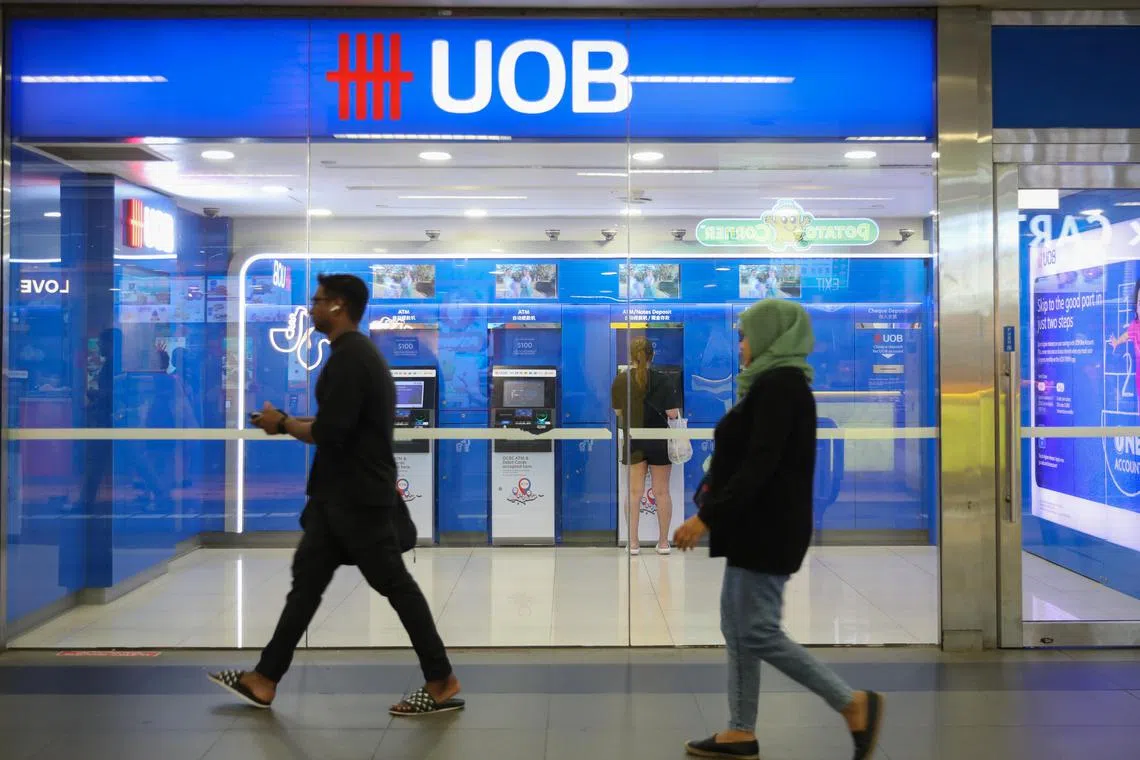UOB pauses earnings guidance on tariff uncertainties; CEO says Covid-19 was worse
Sign up now: Get ST's newsletters delivered to your inbox

UOB posted net profit for the first quarter of $1.49 billion, unchanged from a year ago.
ST PHOTO: TARYN NG
SINGAPORE – UOB on May 7 reported flat earnings for the first quarter, missing analysts’ expectations, as macroeconomic uncertainties from US tariffs weighed on the bank’s performance.
For the January-March quarter, UOB’s net profit stayed unchanged year on year at $1.49 billion.
The earnings missed the $1.54 billion forecast by analysts in a Bloomberg poll.
In a statement, UOB chief executive Wee Ee Cheong said that macroeconomic uncertainties from US tariffs had triggered significant market volatility and disruptions in global trade.
“We anticipate a slowdown in global growth in the near term and remain vigilant amid the uncertain global outlook,” he said.
UOB shares fell 1.4 per cent, or 49 cents, to close at $34.49 on May 7.
Singapore’s third-largest bank also paused its 2025 earnings guidance, saying it will resume this when the macroeconomic situation stabilises.
At its fourth-quarter results briefing in February, it forecast high single-digit loan growth and double-digit fee growth in 2025.
Still, the current uncertainties are not as bad as during the Covid-19 pandemic, Mr Wee said at a results briefing on May 7.
During the first quarter, credit costs increased 12 basis points (bps) year on year to 35 bps to strengthen provision coverage.
In comparison, credit costs went up to 57 bps during Covid-19, UOB said. The bank had also guided for 25-30 bps for 2025 back at its February results briefing.
Allowances for credit and other losses rose 78 per cent to $290 million in the quarter, signalling caution in a challenging environment.
But Mr Wee said Asean’s competitive advantage in manufacturing and commodities will help ensure its relevance as global supply chains reconfigure, such as by shifting factories to other countries.
As a result, trade flows within Asean and between Asean and the rest of the world will continue to grow, and UOB is well-positioned to capture the flows, he said.
“Most of our trade finance lending continues to be done within the region, reflecting strong intra-regional activities,” Mr Wee said.
For the first quarter, net interest income increased 2 per cent to $2.41 billion from a year ago, led by robust loan growth.
Net fee income rose 20 per cent year on year to $694 million, driven by growth in loan-related and wealth management fees.
“The wealth management business continues to be underpinned by a shift from deposits to investments and net new money flows coming in continue to encourage us, but it was also balanced by market dislocations,” group chief financial officer Leong Yung Chee said, adding that most clients are adopting balanced portfolios with a focus on wealth preservation.
Meanwhile, other non-interest income fell 5 per cent year on year to $554 million from lower trading and investment income.
UOB said it remains committed to its $3 billion capital distribution plan. It has already commenced share buyback, and the first tranche of the 25 cents special dividend has been paid, Mr Wee said.
The bank in February announced a $3 billion package of special dividends and share buybacks to be delivered to shareholders over the next three years, as it delivered a record profit of $6 billion for 2024.
UOB kicked off the local banks’ earnings season, with DBS due to report on May 8 and OCBC on May 9.
Morningstar senior equity analyst Michael Makdad said the market should not necessarily be worried about UOB not giving guidance, despite the downside for credit costs and significant uncertainty that led to it.
“UOB management doesn’t have a crystal ball into how the tariff situation will evolve, so it’s natural that they might pause guidance here. I think DBS and OCBC are likely to do the same, though they might offer more of a range rather than just pulling guidance completely,” he said.
IG market strategist Yeap Jun Rong said: “We’ve also seen overseas companies taking similar steps, so investors are likely to interpret this as a reflection of broader market unpredictability, rather than underlying weakness.”
He added: “Despite the earnings miss, UOB’s results still demonstrate notable resilience. While net interest margins are largely expected to soften, the pace of moderation remains gradual. Meanwhile, fee income has maintained its momentum, providing a crucial buffer to support overall earnings.”


